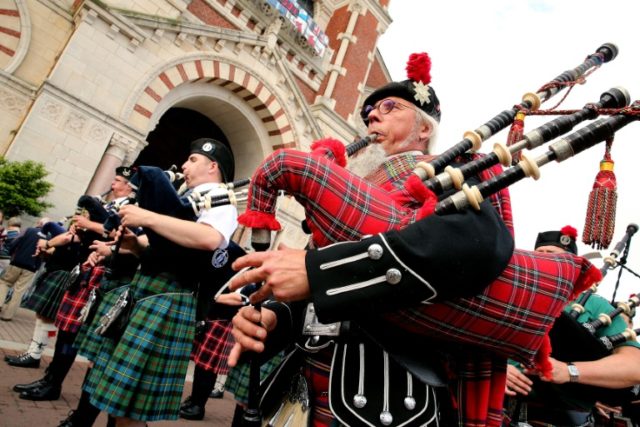Albert (France) (AFP) – Britain’s Prince William and his wife Kate were on Thursday set to commemorate the 100th anniversary of the Battle of the Somme, the deadliest battle in British history in which 20,000 men died on the first day of combat alone.
The royal couple, accompanied by William’s brother Prince Harry, were due to attend a night vigil at the Thiepval Memorial in northern France to honour the 1.2 million troops of different nationalities who were killed, injured or listed as missing in the World War I battle.
In the nearby village of Albert, a band of pipers in Scottish kilts earlier paraded through the streets in memory of the dead.
Guests from Commonwealth countries and members of the public will hold a vigil overnight until 7:30 am (0530 GMT), the exact time that tens of thousands of troops clambered out of the trenches to be mown down by German guns.
In addition to around 20,000 British fatalities on that first day, tens of thousands more were maimed or wounded.
“It’s quite emotional in a way. I feel it’s important to remember these things,” said 73-year-old Irishman William Vernon, arriving under rainy skies to attend the main commemoration ceremony set for Friday.
Vernon said he was coming to remember his great-uncle — also named William — a banker who died aged 26 in the Battle of the Somme on July 16, 1916. Like the 10,000 members of the public attending, he applied for his ticket online.
Vernon’s son, William, 33, said he felt it was important to pay tribute to his relative who died “in the most horrendous conditions. It was an absolutely awful war, a pointless war. To be in the trenches was absolute torture”.
Bob Bandy, 68, an engineer from south London, told of how his grandfather, who was half-German, fought on the British side and was wounded but lived to tell the tale.
“He got interned when they found out, then he came back again.”
“It’s interesting to see where he would have been. It’s quite frightening when you think about it,” Bandy said, visiting the Longueval memorial to South African and British soldiers.
– ‘Still friends’ post Brexit –
Beleaguered British Prime Minister David Cameron — mired in a battlefield of his own after Britain voted to leave the European Union — has confirmed he will attend Friday’s ceremony alongside French President Francois Hollande.
Hollande made a last-minute change to his schedule to attend because, “beyond what is happening at a European level, the United Kingdom remains a friend with which France wants to keep a relationship,” a source close to the president told AFP.
Britain’s Prince Charles will also attend the main ceremony at Thiepval on Friday, one of six in the Picardy region, according to local authorities.
The Thiepval Memorial is the largest Commonwealth war memorial in the world, commemorating more than 72,000 missing servicemen.
On the Allied side, the battle, which lasted nearly five months, was seen as a military tragedy not only for the British, but also for their comrades in arms from Ireland, South Africa, New Zealand, Australia and Canada. Officials from those countries will also attend.
– Futility of war –
The Battle of the Somme was launched on July 1 as Allied forces hoped to relieve the pressure on the French, who were racking up losses in Verdun by attacking the Germans further north at the Somme.
However carnage ensued on both sides despite the frontline barely moving, in a battle that came to symbolise the horrors of trench warfare and the futility of the war.
One hundred years on, the rolling fields of wheat, maize and sugar beets in the French countryside have become a popular site for “war tourism”, with descendants of the fallen visiting scores of military cemeteries in the region.
Green, overgrown warrens of trenches can still be found, where soldiers once suffered in the thick mud, harassed by rats and haunted by the dead bodies of fallen comrades.
“The rank stench of those bodies haunts me still, and I remember things I’d best forget,” wrote English poet Siegfried Sassoon, who fought in the battle.
In all, the British Empire Forces lost some 125,000 men in the battle, according to the Commonwealth War Graves Commission which still maintains 240 cemeteries in the area.

COMMENTS
Please let us know if you're having issues with commenting.